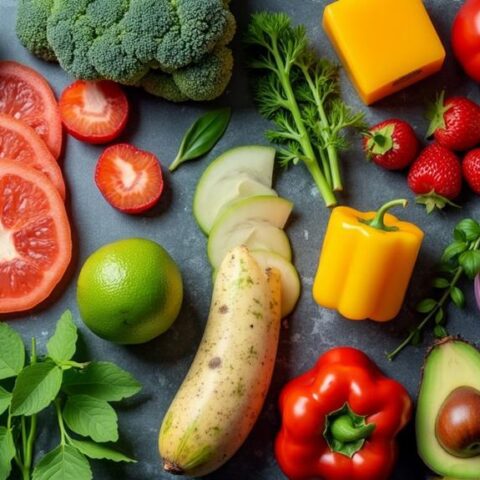
A clean keto diet focuses on whole, unprocessed foods, adhering to a low-carb, high-fat eating style. It aims for macronutrient ratios of 70-80% fat, 20-30% protein, and 5% carbohydrates. This diet supports stable energy levels, improved metabolism, and sustainable weight loss by encouraging healthy fat sources such as olive oil and avocados, nutrient-dense proteins, and fiber-rich vegetables. A clean keto approach contrasts with "dirty keto" by avoiding processed foods, thereby reducing inflammation and supporting gut health. Effective meal planning is essential. Understanding these principles further reveals the broad health benefits associated with clean keto dieting.
Key Takeaways
- Clean keto emphasizes whole, unprocessed foods while maintaining a low-carb, high-fat macronutrient ratio.
- It focuses on nutrient-dense foods like grass-fed meats and non-starchy vegetables to optimize health.
- Healthy fat sources include avocados, olive oil, and coconut oil to support heart health and ketone production.
- Clean keto reduces inflammation and stabilizes blood sugar by avoiding processed foods.
- It prioritizes gut health through fiber-rich vegetables and minimally processed food intake.
Understanding Clean Keto
Delving into the concept of Clean Keto, this dietary approach is distinguished by its emphasis on whole, unprocessed foods while adhering to a low-carb, high-fat regimen. The Clean Keto diet prioritizes nutrient density, focusing on macronutrient ratios that typically consist of 70-80% fat, 20-30% protein, and 5% carbohydrates.
This approach integrates clean eating principles, advocating for the consumption of grass-fed meats, wild-caught seafood, eggs, non-starchy vegetables, nuts, seeds, and healthy oils such as olive and coconut oil. Including healthy oils like olive oil, which is rich in monounsaturated fats, can improve heart health by lowering LDL cholesterol. These food choices are designed to enhance overall health and gut function.
The Clean Keto lifestyle facilitates various long-term health benefits. It aims to stabilize energy levels, improve metabolism, and support sustainable weight loss. By emphasizing nutrient-rich foods, Clean Keto reduces the risk of nutrient deficiencies and negative health outcomes associated with processed foods, artificial sweeteners, and unhealthy fats.
This dietary strategy necessitates significant lifestyle changes, encouraging individuals to engage in meal planning and preparation. Consequently, adherence to Clean Keto can foster a more disciplined approach to eating, reducing reliance on convenience foods and promoting a more mindful, health-focused lifestyle.
Key Principles of Clean Keto
The Clean Keto diet prioritizes nutrient-dense food choices by focusing on whole, unprocessed foods that provide essential vitamins and minerals.
Central to this dietary approach is an emphasis on healthy fat sources, such as olive oil and avocados, which support the body's shift into ketosis while promoting heart health.
It also includes a variety of protein sources like fresh meats and poultry, which offer carb-free protein that is ideal for this diet.
Nutrient-Dense Food Choices
While traditional ketogenic diets focus primarily on macronutrient ratios, Clean Keto places a significant emphasis on the quality and nutrient density of food choices. This approach advocates for the consumption of whole, nutrient-dense foods such as grass-fed meats, wild-caught fish, non-starchy vegetables, and healthy fats like avocados and olive oil.
By prioritizing these high-quality food sources, Clean Keto aims to optimize nutrient timing and portion control, ensuring that each meal contributes positively to overall health and metabolic functions.
Incorporating foods rich in vitamins and minerals, such as leafy greens, berries, and nuts, is central to Clean Keto. These choices enhance nutrient absorption and support metabolic processes while minimizing the intake of processed foods.
High-quality protein sources are also emphasized, as they provide essential amino acids, promote satiety, and support muscle maintenance during fat loss phases.
Additionally, Clean Keto focuses on fiber-rich options to maintain gut health, as opposed to low-quality processed alternatives that can disrupt the microbiome and cause inflammation.
Whole Foods Emphasis
How does the Clean Keto diet guarantee its effectiveness and sustainability? Central to its approach is a strong emphasis on whole foods, which offers numerous advantages over processed alternatives.
Consuming whole, unprocessed foods like grass-fed meats, wild-caught seafood, and leafy greens provides a foundation rich in nutrient synergy. This synergy is vital for achieving a balanced intake of essential vitamins and minerals, often lacking in processed foods. The Clean Keto diet's emphasis on whole foods assures that the nutritional needs are met while adhering to its macronutrient goals.
Key benefits of the whole foods emphasis in Clean Keto include:
- Enhanced Nutritional Value: Whole foods are naturally rich in essential nutrients, maximizing nutrient density while maintaining the low carbohydrate intake under 50 grams per day. This approach helps in achieving ketosis while supporting overall health.
- Improved Health Outcomes: By focusing on quality ingredients, Clean Keto can mitigate the risks associated with nutrient deficiencies and health issues linked to processed foods.
- Sustainability and Variety: Incorporating diverse cooking techniques and meal preparation strategies with fresh ingredients not only supports ketosis but also encourages a sustainable and satisfying eating pattern, essential for long-term adherence.
Healthy Fat Sources
Avocados, often hailed as a superfood, epitomize the emphasis on healthy fat sources within the Clean Keto diet. Known for their rich content of monounsaturated fats, avocados offer numerous avocado benefits, including providing essential nutrients such as potassium and fiber. These attributes make them a cornerstone in achieving the nutrient balance required in a Clean Keto regimen, promoting heart health and digestive wellness.
Another integral component is olive oil, particularly extra virgin olive oil, which is lauded for its heart-healthy fats and high antioxidant levels. This oil is a versatile addition to the diet, ideal for both cooking and as a dressing, enhancing the flavor and nutritional profile of meals. Its inclusion in Clean Keto supports cardiovascular health, aligning with dietary goals focused on longevity and wellness.
The Clean Keto approach also incorporates coconut oil, valued for its medium-chain triglycerides (MCTs), which boost ketone production and provide rapid energy.
In addition, grass-fed butter and ghee offer higher omega-3 fatty acids and fat-soluble vitamins than conventional alternatives. Nuts and seeds, such as almonds and walnuts, contribute additional healthy fats, fiber, and protein, enhancing nutrient density and satiety.
Clean vs. Dirty Keto

In the domain of ketogenic diets, the distinction between "clean" and "dirty" keto is pivotal for understanding their differing impacts on health and wellness. A common keto misconception is that macronutrient ratios alone dictate the diet's success, disregarding the importance of food quality.
Clean keto emphasizes whole, unprocessed foods such as grass-fed meats, non-starchy vegetables, and healthy fats, while dirty keto allows for processed and fast foods if macronutrient ratios—typically 70-80% fat, 20-30% protein, and 5% carbohydrates—are met.
Clean keto's focus on whole foods also supports cardiovascular health by promoting lower LDL levels and reducing visceral fat, key factors in heart disease prevention. This dietary flexibility in dirty keto can lead to nutrient deficiencies and poor health outcomes.
- Nutrient Density: Clean keto maximizes micronutrient intake, supporting gut health and reducing inflammation, while dirty keto often results in deficiencies due to processed food reliance.
- Health Outcomes: Sustainable fat loss and improved well-being are more likely with clean keto, whereas dirty keto may achieve short-term weight loss but hinder long-term health.
- Blood Sugar Levels: Clean keto foods help stabilize blood sugar and reduce inflammation, contrasting with dirty keto's potential health risks from high sodium and additives.
Nutritional Benefits
A clean keto diet offers significant nutritional benefits by prioritizing whole, unprocessed foods that enhance overall health. This approach emphasizes the consumption of nutrient-dense foods, such as leafy greens, grass-fed meats, and healthy fats, which are rich in essential vitamins and minerals. By focusing on these food sources, the diet enhances micronutrient absorption, ensuring that the body receives the necessary nutrients to support ideal functioning.
In addition, this diet is known to reduce inflammation, which can further support overall health and reduce the risk of chronic conditions. Another notable benefit is its potential to enhance cognitive performance due to the steady energy provided by ketones. This can lead to improved energy levels and a reduction in the risk of chronic diseases.
Moreover, clean keto plays a significant role in blood sugar stabilization. By minimizing the intake of added sugars and processed carbohydrates, the diet helps maintain stable blood sugar levels, promoting better metabolic health. This stability can reduce cravings and prevent the spikes and crashes in energy often associated with high carbohydrate consumption.
Additionally, the inclusion of fiber-rich vegetables supports gut health and digestion by fostering a healthy microbiome. A well-balanced gut microbiome is essential for overall wellness, as it aids in nutrient absorption and supports the immune system.
Impact on Weight Loss

Sustainability is a hallmark of the clean keto diet, particularly concerning its impact on weight loss. The clean keto approach emphasizes whole, nutrient-dense foods, promoting sustainable habits that aid in weight management.
This diet highlights non-starchy vegetables, rich in fiber, which research suggests can increase the likelihood of maintaining weight loss by 30%. The inclusion of these vegetables not only enhances satiety but also helps regulate calorie intake more effectively than processed alternatives.
Additionally, the clean keto diet supports insulin regulation by minimizing carbohydrate intake, leading to lower insulin production and reduced hunger cravings. This mechanism plays a significant role in appetite control and sustainable weight loss.
- Regulation of Calorie Intake: By focusing on nutrient-dense foods, individuals following a clean keto diet can control their calorie consumption, contributing to long-term success in weight management.
- Mitigation of Cravings: The diet's emphasis on low-glycemic foods minimizes blood sugar spikes, reducing cravings and helping maintain steady energy levels, essential for sustainable weight loss.
- Long-term Weight Stability: Participants often report sustainable weight loss and reduced likelihood of weight regain due to healthier eating habits developed during the clean keto regimen.
In contrast to the 'dirty keto' approach, which may offer short-term results, the clean keto diet fosters a balanced approach. This balance supports long-term success by encouraging sustainable habits and a more consistent weight management strategy.
Gut Health Advantages
The clean keto diet offers significant advantages for gut health by emphasizing whole, unprocessed foods that support a thriving gut microbiome.
By reducing the consumption of processed foods laden with additives and preservatives, this dietary approach helps mitigate inflammation and promotes a balanced gut environment.
Additionally, the inclusion of fiber-rich vegetables and healthy fats aids in maintaining gut barrier function and stabilizing blood sugar levels, further enhancing overall gastrointestinal well-being.
This approach also addresses digestive challenges associated with low fiber intake by incorporating low-carb, high-fiber vegetables like spinach and broccoli, which help alleviate common issues such as constipation and bloating.
Microbiome Benefits
Delving into the domain of gut health, the clean keto diet stands out as a beneficial approach to supporting a diverse and balanced microbiome. This dietary strategy, characterized by a focus on whole foods and healthy fats, has been shown to foster microbiome diversity, an essential factor in maintaining ideal digestive and immune functions.
The inclusion of high-fiber, non-starchy vegetables is particularly important, as these foods promote the growth of beneficial gut bacteria, enhancing nutrient absorption and overall gut health.
The gut-brain connection underscores the importance of a healthy microbiome. Studies indicate that the principles of clean keto may contribute to improved mental health outcomes by reducing anxiety and enhancing cognitive function. This is achieved through the modulation of gut flora, which plays a pivotal role in neurotransmitter production and inflammation regulation.
Key Benefits of Clean Keto for Gut Health:
- Microbiome Diversity: Encourages a varied microbial population vital for digestive and immune health.
- Gut-Brain Connection: Supports mental health through improved microbiome balance.
- Reduced Inflammation: Emphasizes nutrient-dense foods that help decrease gut inflammation, lowering the risk of chronic diseases.
These attributes highlight the clean keto diet's potential to enhance gut health considerably.
Reduced Processed Additives
Often overlooked, the reduction of processed additives in the clean keto diet plays a significant role in promoting gut health. Clean keto emphasizes the elimination of processed foods, which are typically laden with additives, preservatives, and unhealthy fats that can compromise gut health.
By opting for processed food alternatives and focusing on additive free recipes, individuals can enhance gut microbiome diversity, a key factor for ideal digestion and immune function.
Scientific studies have consistently shown that high intake of processed foods disrupts gut homeostasis, potentially leading to inflammation and gastrointestinal issues. In contrast, the clean keto diet fosters a balanced gut environment. This is achieved by prioritizing whole foods, including fiber-rich vegetables, which are essential to supporting healthy digestion and regular bowel movements.
Moreover, clean keto practices involve steering clear of artificial sweeteners commonly found in processed items. This approach aids in maintaining a healthier gut lining, contributing to overall gastrointestinal well-being.
Meal Preparation Tips

Planning meals in advance is essential for maintaining a successful clean keto diet, as it guarantees you have nutrient-dense ingredients readily available, streamlining grocery shopping and minimizing food waste.
By developing a structured meal planning strategy, individuals can focus on acquiring fresh, whole foods such as meats, vegetables, and healthy fats. This approach not only simplifies grocery shopping but also supports adherence to dietary goals.
For further assistance, consider utilizing efficient cooking methods that save time and confirm meals are flavorful and compliant with keto guidelines.
Consider the following tips to enhance your clean keto meal preparation:
- Batch Cooking: Prepare large quantities of meals like soups or casseroles that can be portioned and stored in the fridge or freezer. This provides quick access to healthy meals throughout the week, saving time and reducing the temptation of processed foods.
- Organized Grocery Lists: Keep a detailed grocery list that emphasizes essential clean keto ingredients. This guarantees a consistent supply of nutrient-dense foods, further facilitating meal planning and reducing food waste.
- Meal Prep Containers: Use meal prep containers to portion out daily meals and snacks. This method simplifies adherence to dietary goals and promotes consistent intake of clean keto-approved foods.
Cost Considerations
While adopting a clean keto diet may initially seem financially demanding, understanding cost considerations can facilitate more economical choices. On average, clean keto diets cost approximately $1.50 more per day than less healthy alternatives, largely due to the emphasis on high-quality, nutrient-dense foods such as grass-fed meats and organic vegetables.
However, budget strategies such as emphasizing whole foods over processed options can help manage these expenses effectively. Meal planning and preparation are pivotal budget strategies that can mitigate costs. By minimizing food waste and maximizing the use of fresh ingredients, individuals can achieve better budget management. Planning meals ahead guarantees the efficient use of purchased items, reducing unnecessary expenditure.
Additionally, grocery tips such as shopping for seasonal produce and taking advantage of sales on fresh meats can further reduce costs. Seasonal items are often less expensive and offer better quality, while sales provide opportunities to stock up on costly items at reduced prices.
Investing in clean keto foods also presents potential long-term savings by decreasing health-related expenses associated with chronic illnesses linked to poor nutrition. While the initial investment may be higher, the focus on whole foods can enhance overall health, potentially reducing healthcare costs over time.
Frequently Asked Questions
What Is an Example of a Clean Keto Diet?
A clean keto diet example includes grilled salmon paired with sautéed spinach and avocado. This meal emphasizes whole foods and clean fats, ensuring nutrient density while maintaining low carbohydrate intake, thereby promoting balanced nutrition and supporting metabolic health.
What to Avoid on Clean Keto?
To maintain the integrity of a clean keto diet, one should avoid processed foods, hidden sugars, and unhealthy fats. Additionally, steer clear of products containing artificial additives, as these elements can undermine nutritional goals and hinder ketosis.
How to Start a Clean Keto Diet?
To commence a clean keto diet, emphasize strategic meal planning and incorporate nutrient-dense snack ideas. Gradually reduce carbohydrates, increase healthy fats, and focus on whole foods to facilitate a smooth shift to ketosis while maintaining nutritional balance.
How Many Carbs Are on Clean Keto?
On a clean keto diet, carbohydrate intake is limited to under 50 grams daily. This necessitates meticulous carb tracking and selection of low-carb sources such as non-starchy vegetables, berries, and nuts to maintain ketosis effectively.
Conclusion
The clean keto diet emphasizes whole, unprocessed foods, aligning with principles of nutritional integrity and sustainability. Distinct from the "dirty" keto variant, it offers superior health benefits, including improved weight management and enhanced gut health. By adhering to clean eating practices, individuals may optimize nutrient intake while minimizing potential negative health impacts associated with processed foods. Although clean keto may involve higher costs and require careful meal planning, its extensive health benefits may justify these considerations.










No Comments